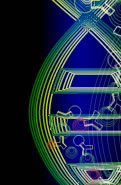

Single molecule studies of filamentous RecA/DNA complex with magnetic tweezers and advanced fluorescence microscopy in microfluidic devices (Collaborator: Prof. Ting-Fang Wang)
The RecA family of proteins mediate homologous recombination, an evolutionarily conserved pathway that maintains genomic stability by protecting against DNA double strand breaks. RecA proteins are thought to facilitate DNA strand exchange reactions as right-handed helical filaments. Recent reports showed that RecA family proteins could also form left-handed helical filaments. Structural and functional analyses of wild-type and mutant proteins support the hypothesis that ATP-dependent axial rotation (from right-handed to left-handed) of RecA protein filaments may play crucial roles in promoting homologous pairing and strand exchange reactions. To investigate the function of wild type and mutant RecA proteins and to verify the ATP-dependent axial rotation hypothesis, we exploit single molecule techniques. This approach involves a few techniques, including surface functionization, micro-hydrodynamic flow, magnetic tweezers, and fluorescence microscopy.
References:
1. Wang, T. F., Chen, L. T., and Wang, A. H. (2008) Bioessays 30, 48-56 (2008). "Right or left turn? RecA family protein filaments promote homologous recombination through clockwise axial rotation."
2. Kim, S., Blainey, P. C., Schroeder, C. M., and Xie, X. S. (2007) Nat Methods 4, 397-399. "Multiplexed single-molecule assay for enzymatic activity on flow-stretched DNA. "



POSTAL ADDRESS: 周家復老師實驗室 中央研究院物理所 北市115南港區研究院路二段128號 128, Sec. 2, Academia Rd., Nankang District, Taipei 11529, Taiwan. PHONE: 886-2-2789-6761 Office / 886-2-2789-8447/ 8908 Lab. FAX: +886-2-2651-0704 E-mail contact: cfchou@phys.sinica.edu.tw